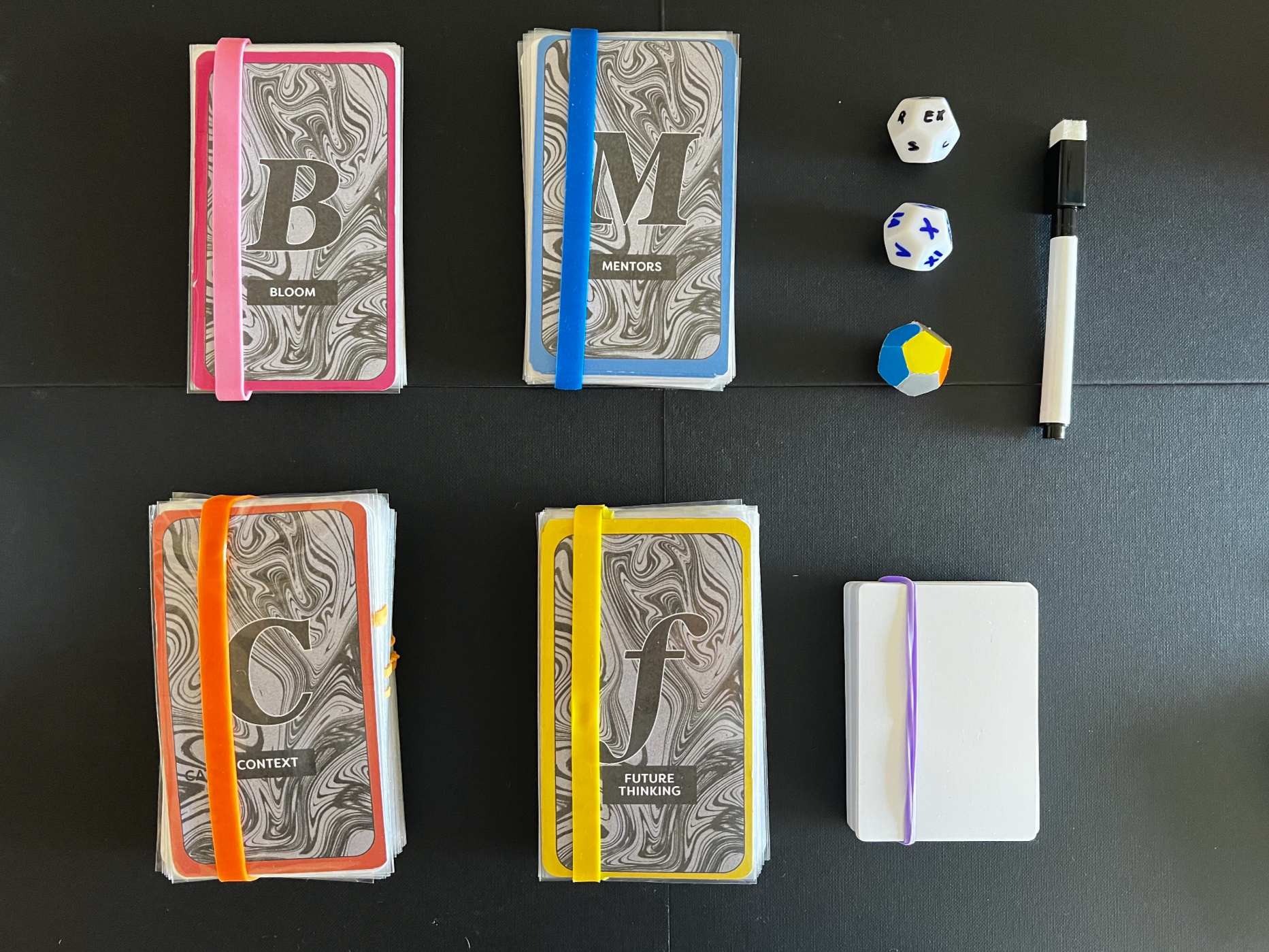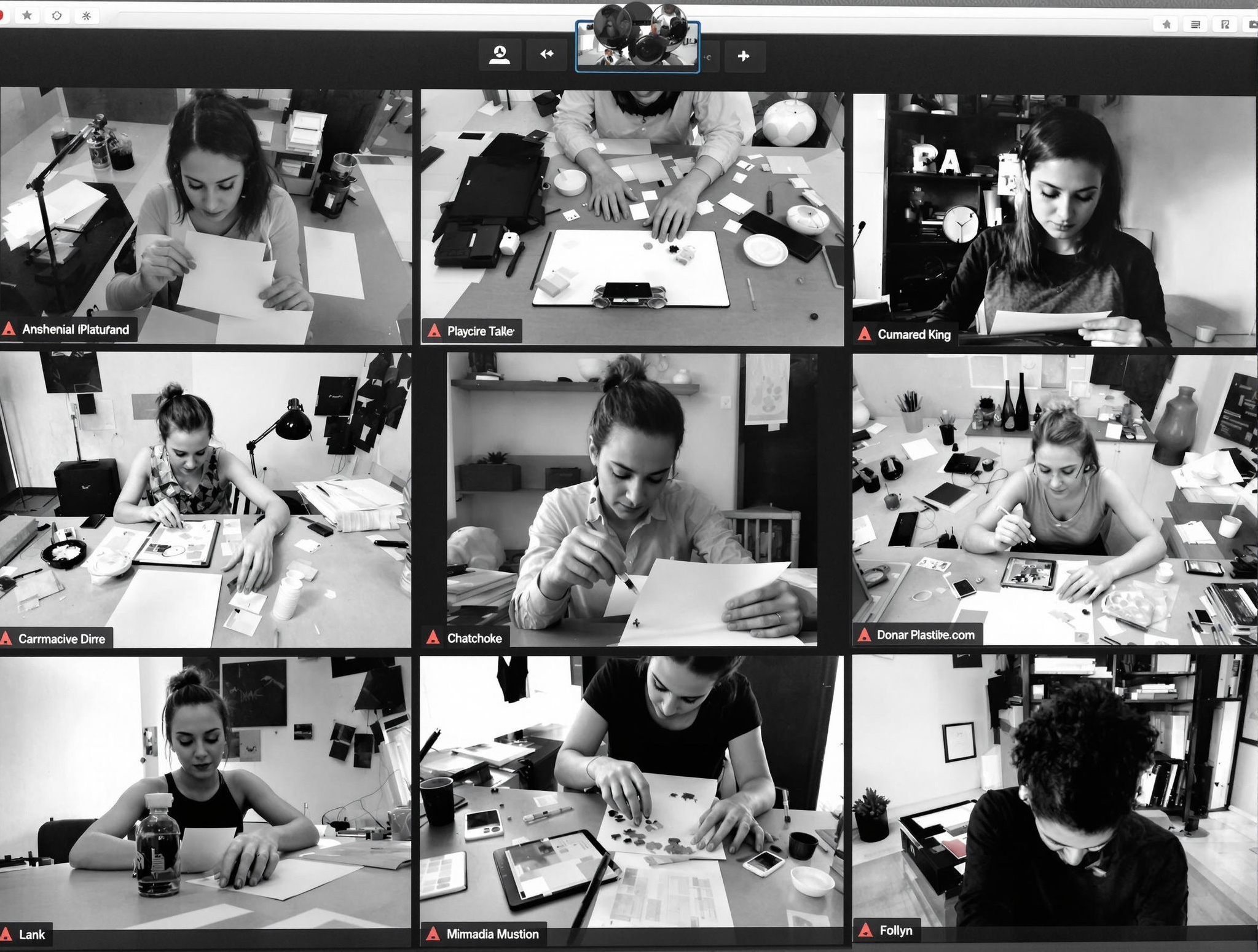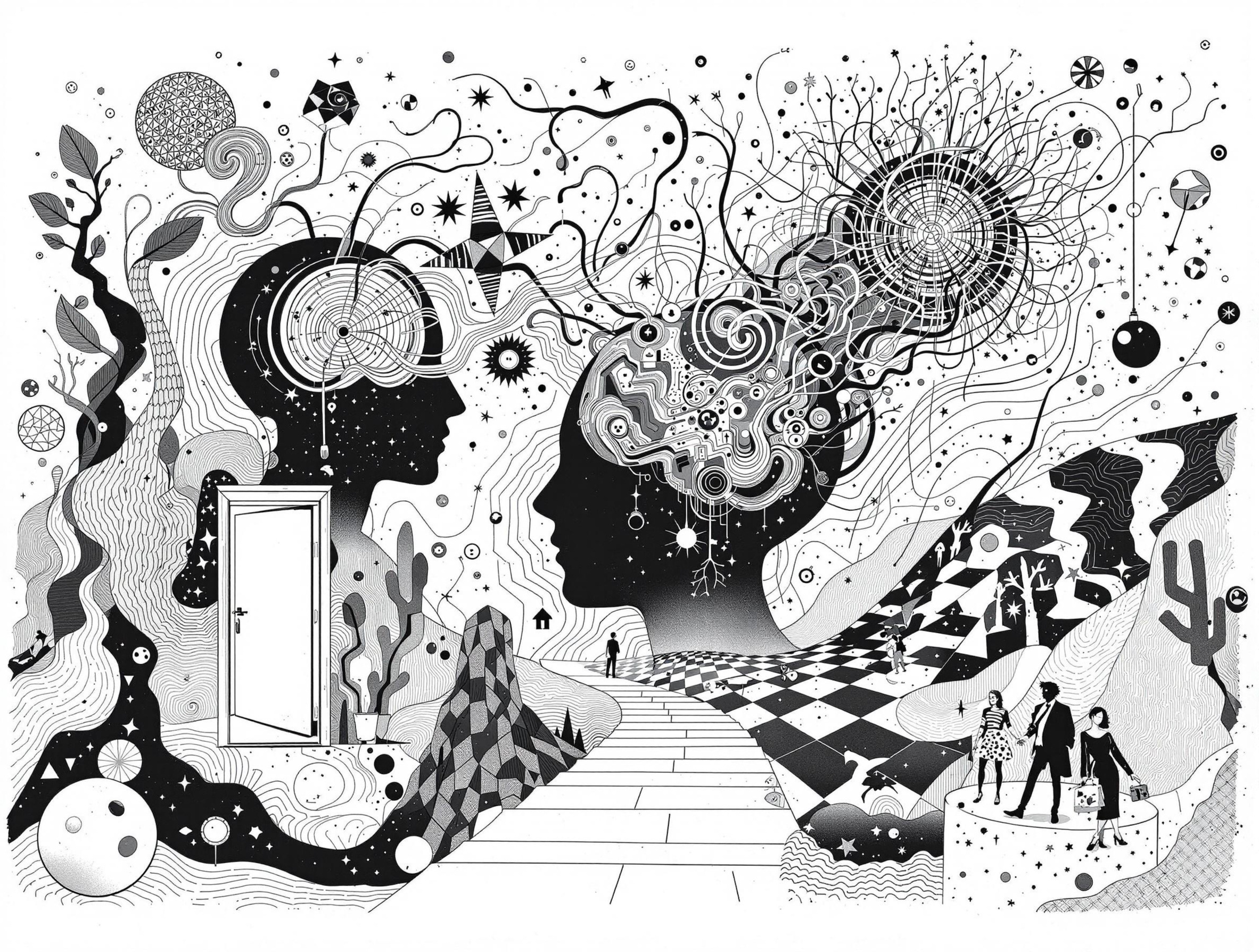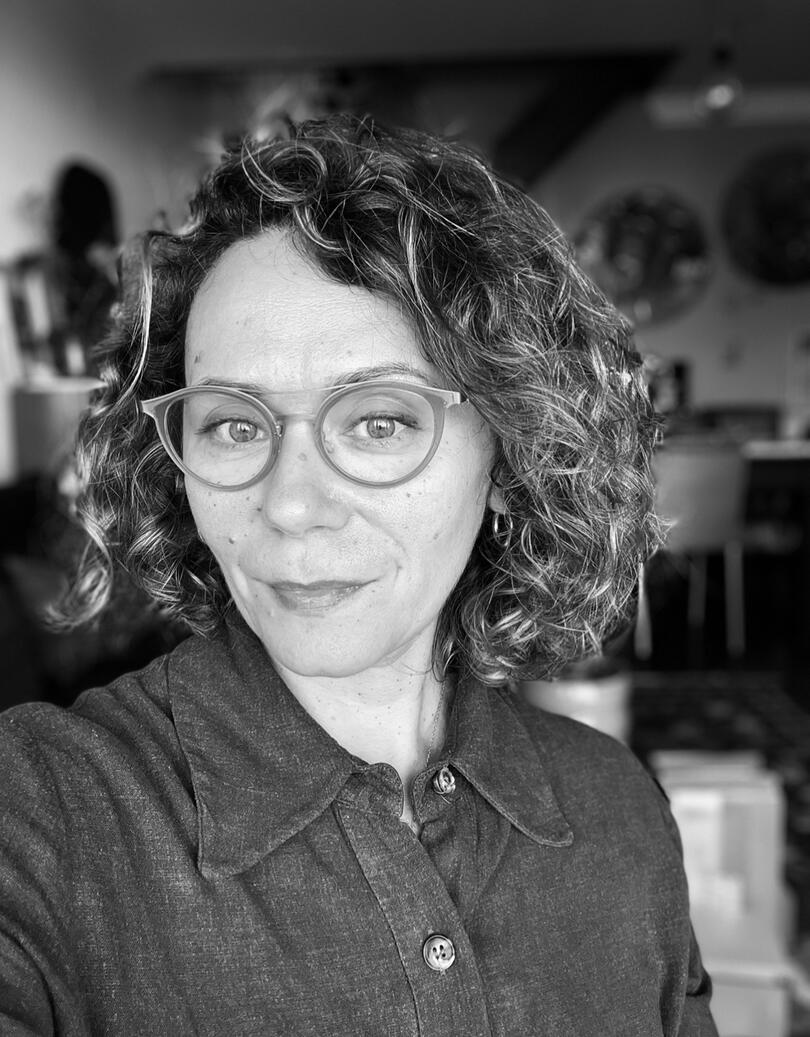
Acts of the re·imaginable
A deck for mediating futures
in urban ecologies through imagination, co-design,
and active listening.
Acts of the re·imaginable are a civic design tool crafted to prototype trust, facilitate symbolic repair, and cultivate futures literacy within living urban ecologies. Rooted in participatory practices, these cards guide communities and organizations through a dynamic process of reflection, dialogue, and co-creation—building resilient networks of care and collective intelligence.By activating imagination and fostering empathetic listening, this deck empowers diverse groups to navigate ruptures in social trust, regenerate bonds, and envision inclusive, sustainable futures grounded in shared responsibility and territorial sensibility.
We live in a moment where public participation, mental health, and collective imagination are no longer optional — they are the groundwork of any viable future. In this interdependent era, a renewed culture of care and design as care are essential for both healing and transformation.Acts of the re·imaginable is a pedagogical mediation and speculative design system, created to nourish what often remains invisible but vital: social infrastructures, territorial sensibility, and the emotional commons of our time.Built at the intersection of civic co-creation, futures literacy, and transformative education, this methodology draws from validated frameworks in psychology, artistic research, and community design. It invites groups, institutions, and territories into a creative process of:Prototyping trust — Mapping ruptures and regenerating social cohesion within communities, schools, and organisations.Caring for mental health as infrastructure — Enabling emotional safety, active listening, and shared resilienceTerritorial regeneration — Valuing symbolic repair, rooted knowledge, and place-based collective intelligenceSpeculating public futures — Using imagination as a civic muscle to rehearse transitions and nurture hopeRather than forecasting the future, we engage in speculative practices that prepare us to co-inhabit complexity—ethically, playfully, and with care. Our work is inspired by global agendas such as the WHO Mental Health Strategy and the SDGs, but always grounded in local stories, gestures, and needs.This is not a product. It is a living process.
A field guide for those building public futures.
A toolkit for educators, artists, designers, and all who are ready to listen, feel, and act together.Welcome to Acts of the re·imaginable—where trust is grown, and the future is sensed before it is shaped.
Did you know?
Key Facts & Insights about Mental Health X Futures Thinking
- Mental health is now recognized as critical infrastructure for the future—just as vital as energy, transportation, or digital networks—for any society aiming to be resilient and regenerative.
- Trust is the invisible foundation of collective mental health. When social trust collapses, our shared capacity to imagine, plan, and act on better futures also breaks down.
- The World Economic Forum and other global leaders identify mental health as a systemic risk, equal in importance to climate change and technological disruption, due to its profound effects on productivity, economic growth, and social cohesion.
Collective Imagination & Social Fabric
- Imagination is a skill that can be strengthened. Futures literacy helps communities shift from fear and paralysis to hope and empowered creativity.
- When the collective image of the future fractures, emotional disconnection and anxiety grow—restoring positive future narratives is both a healing and civic responsibility.
- Narrative practices like storytelling humanize complex systems, reveal hidden dynamics, and enable groups to co-create more just, hopeful realities.
Mental Health & Megatrends
- Megatrends such as AI, climate change, and demographic shifts are not merely background—they actively shape mental health, generating new challenges and adaptation demands.
- Younger generations, especially Gen Z and Alpha, face unique mental health pressures including constant comparison, digital overwhelm, and reputation anxiety, while also showing openness to collective, stigma-free approaches to emotional care and future-building.
Systemic & Social Dimensions
- Mental health depends as much on repairing social fabric—trust, belonging, shared meaning—as on individual therapy.
- Stigma against mental health is as harmful as other forms of discrimination; it blocks access to care and limits society’s ability to regenerate.
- Workplaces are key sites for mental health innovation: cultures of support, openness, and continuous learning are essential for wellbeing and adaptability.
Futures Tools in Practice
- Futures Cards and similar tools enhance metacognition, helping people recognize cognitive biases, regulate emotions, and experiment with new ways of thinking and acting.
- Workshops that blend futures thinking with therapeutic care turn anxiety about uncertainty into agency, hope, and strategic action.
- When imagination is harnessed collectively, it becomes a powerful force for resilience—enabling communities to envision and build futures where hope is an active, regenerative practice.

The Workshops Journey
The Acts of the re·imaginable are a tool for collective futures thinking and mental health care — co-designed by and for communities in transition.
| Voluntary | Voluntary | Voluntary | |
|---|---|---|---|
| Workshop 01 — Archetypes & Iconologies | Elisabetta Pasini Social Dreaming | ||
| Workshop 02 — Storytelling as a Relational Mediator | Marcus Santos Entrepreneurship | Daniela Basílio Innovation | João Soares Org.Psychology |
| Workshop 03— Unique & Universal | Sabrina Donzeli Cultural Antropology | Aline Monçores Design Sociology | |
| Workshop 04— Why the Future? & Mutimodalities | Joana Frada Art-Therapy | Francisco Ladeira Art Therapy | |
| more soon... |
Thank you to all the participants who are making this project possible!
Alessandro Manetti. Aline Monçores. Anne Gyllenklev, Francisco Ladeira, Gastón Lysak, João Soares, Mariana Reis, Martyn R., Nicole Vindel, Sabrina Donzeli, Tiago Abreu, Umar Sheraz, Slice Casiraghi, Anja Joubert, Barbara, Cathy, Daniela Basílio, Gen, J., Julian, Marcos Santos, Ramla, Sebi, Thays Prado, Valentina Guzman A.

Open Call for Collab- & Participation
We are currently in an open and exploratory phase of development, and warmly welcome expressions of interest from professionals, researchers, communities, and institutions who would like to engage with the project Acts of the re·imaginable.Whether you're curious about participating in a pilot workshop, interested in contributing to the tool’s validation, or exploring possibilities for partnership or co-creation, your perspective is deeply valued. We are also looking for volunteers to help us test the tool in diverse community contexts, contributing to its refinement and impact.If The Acts of the re·imaginable resonates with your field of work, research, or activism, we’d love to hear from you. Let’s shape this journey together.

Step Into the Game!
Fill out the form above and let yourself be inspired to play the “what if” game.Ready?
About
This project is led by
Sofia Dias
Linkedin in/sofiadias
Dreams · ReMake
Sofia Dias · Studio

Sofia Dias is an artist and researcher exploring the intersection of mental health, futures thinking, and participatory art. She is the creator of Acts of the re·imaginable, a strategic tool that bridges public art, trust repair, and collective imagination. Her work engages with pedagogy, therapeutic practices, and poetic speculation to co-design regenerative pathways for communities and institutions.
Contact
Please let us know how you would like to connect with the Future Cards project:- I want to learn more about Acts of the re·imaginable- I want to participate in a workshop- I want to collaborate as a researcher, therapist, artist, or other professional- I want to receive news and updates

Thanks!
Welcome to our community. If you have any questions, don’t hesitate to get in touch. We offer workshops in Lisbon, online, or at your preferred location. We’re also happy to present our project and its development to professionals interested in this approach. Let’s start the conversation!

